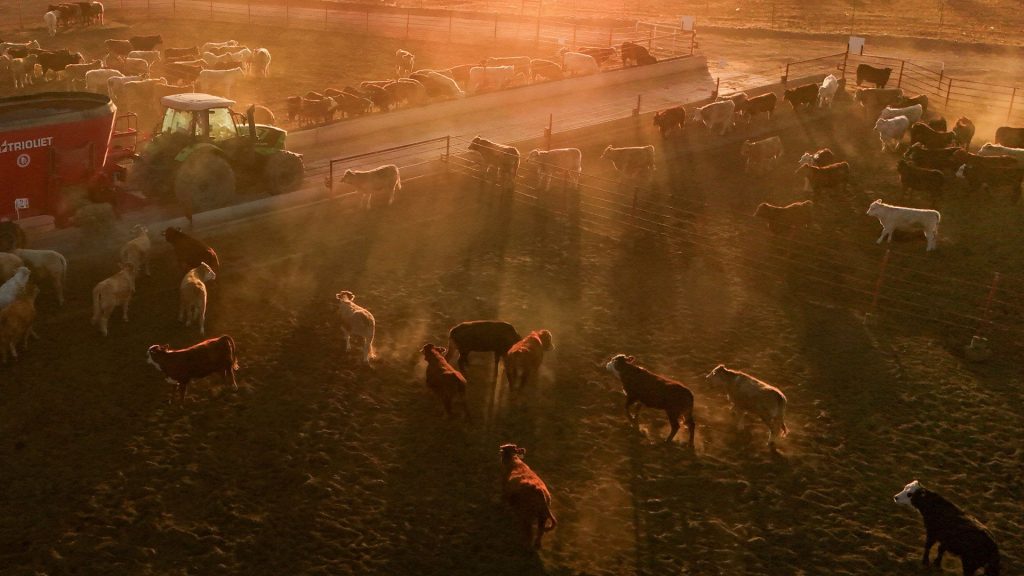USDA could halt Mexican cattle imports over screwworm concerns: Report
Ella Greene April 27, 2025 0
The U.S. Department of Agriculture (USDA) is threatening to halt imports of cattle and bison from Mexico as the New World screwworm (NWS) continues to spread northward. Agriculture Secretary Brooke Rollins detailed U.S. demands in a letter sent to the Mexican government Saturday, April 26, and obtained by Fox News.
New World screwworm larvae can be fatal when they burrow into and feast on the flesh of a living animal, effectively decimating herds. According to the USDA’s Animal and Plant Health Inspection Service (APHIS), NWS can infest livestock, pets, wildlife, occasionally birds, and in rare cases, humans. The USDA eradicated NWS from the U.S. in 1966, however, the agency notes that “there is a constant risk of re-introduction into the United States.”
Why is the USDA concerned?
In her letter, Rollins said that Mexico has until Wednesday, April 30, to work with the U.S. on NWS containment efforts. If Mexico fails to act, the USDA will “restrict the importation of animal commodities” –– including cattle, bison and horses –– “to protect the interest of the agriculture industry in the United States.”
The USDA projected Mexico’s cattle exports to the U.S. to hit 1.25 million head in 2025, marking an 11% decrease compared to 2024.
The USDA’s 1966 eradication effort was achieved using the “sterile insect technique,” or SIT, in which sterile male flies disrupt reproduction and weaken the population, according to the American Veterinary Medical Association.
Rollins stated in her letter that SIT operations rely on daily flights operated by government contractors, including Dynamic Aviation, which are “uniquely equipped to conduct the high-volume, precision aerial releases required to suppress and eliminate the NWS population.” However, according to Rollins, Mexico’s aviation authorities have limited the number of flights Dynamic can conduct to six days a week, as opposed to the necessary seven.
Moreover, Rollins notes that customs authorities in Mexico are “imposing substantial import duties on critical aviation parts, dispersal equipment, and sterile fly shipments,” all of which are financed by the U.S. government, hampering efforts to control the pest.
“We do not understand how our official efforts to stop a common pest can be subject to such burdensome customs duties,” Rollins writes.
Secretary Rollins details collaborative efforts
Now, Rollins’ office is asking Mexico to pave the way for daily Dynamic flights, waive all duties on necessary aircraft equipment, sterile flies and SIT equipment, and designate a high-level point of contact who can work with the USDA on “removing regulatory obstacles with urgency,” according to the letter.
The agency is also proposing a U.S.-Mexico NWS Aerial Dispersal Strategy Meeting that includes representatives from both countries, technical experts and operational partners, “to align our strategy and ensure a seamless and sustained response.”
“The U.S. spent millions of dollars to eradicate New World screwworm from our borders in the 1960s but unfortunately, we are now facing this dangerous threat again,” said Buck Wehrbein, president of the National Cattlemen’s Beef Association. “Screwworm is very destructive and could cost American producers millions of dollars a year if it reaches us. Americans have been investing in prevention efforts in Central America for decades, but we can’t stop this without Mexico’s participation. NCBA strongly supports Secretary Rollins holding Mexico to their commitments regarding screwworm eradication.”
New World screwworm’s northward migration
The recent New World screwworm infestation dates back to at least 2022, when the larvae made their way from Panama to Costa Rica, Nicaragua, Honduras and Guatemala. In November 2024, a case was found in southern Mexico, prompting the APHIS to release $165 million in emergency funding to mitigate its spread while blocking livestock shipments from Mexico to the U.S. Those restrictions were ultimately lifted in February.
“The comprehensive pre-clearance inspection and treatment protocol is now in place and will ensure safe movement of cattle and bison into the United States and mitigate the threat of New World screwworm,” USDA said at the time.
Mexico has until April 30 to respond to Rollins’ requests.
Related Stories
Ella Rae Greene, Editor In Chief
Ella Greene
Ella and the staff at Clear Media Project (CMP) curate these articles.
Unless otherwise noted CMP does not write these articles.
The views, thoughts, and opinions expressed in the articles published on this blog belong solely to the original authors and do not necessarily reflect the views of the blog owner. The blog owner does not claim ownership of the content shared by contributors and is not responsible for any inaccuracies, errors, or omissions.
All rights and credits goes to its rightful owners. No Copyright Infringement is intended. If you believe any content infringes on your rights, please contact us for review and potential removal.





